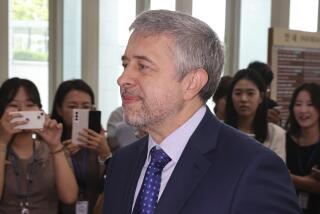U.S. envoy Stephen Bosworth arrives in North Korea for high-level talks
Reporting from Seoul — U.S. special envoy Stephen Bosworth arrived in Pyongyang, the North Korean capital, on Tuesday for three days of high-level meetings that officials hope will draw an isolationist and nuclear-armed nation back to stalled six-party disarmament talks.
The meetings will be the first direct U.S. diplomatic overture to North Korea since President Obama took office this year on a campaign pledge to try to persuade the Stalinist regime to abandon its growing atomic arsenal.
Analysts here say that North Korea will express its displeasure over what it calls a hostile U.S. policy, including strict economic sanctions.
Pyongyang also will push for continued one-on-one nuclear talks with the United States rather than a return to the bargaining table on the six-party basis, which would also involve Japan, South Korea, China and Russia.
“What Pyongyang has strongly insisted is that the United States drop its hostile policy toward North Korea,” said Kim Yong-hyun, a professor of North Korean studies at Dongguk University in Seoul.
“The United States cannot keep demanding that North Korea come back to the negotiation table,” he said. “There should be some justification for North Korea to come back. It’s hard to solve all problems at once.”
But even before Bosworth’s departure for Pyongyang, U.S. officials said there would be no new incentives for North Korea to return to the talks.
In 2005, North Korea pledged to surrender its nuclear weapons in exchange for aid and security guarantees, but it later reneged and walked away from the six-party talks.
This year, the regime conducted an underground nuclear test.
“We don’t intend to reward North Korea simply for going back to something that it previously committed to do,” State Department spokesman Ian Kelly said. “That’s something we’ve seen in the past but has proved to be counterproductive in terms of our overall goals.”
North Korea has long claimed that it needs a nuclear arsenal to protect itself from the well-fortified U.S. military presence in South Korea. Critics say Pyongyang also has used its atomic threat to draw financial aid and other concessions.
In an online article Monday, the Center for Strategic and International Studies wrote that Washington’s latest approach to Pyongyang will be no-nonsense.
“The United States is unlikely to offer any new carrots or incentives to the DPRK [North Korea] to encourage a return to the agreement,” the nonprofit think tank said. “There is very little appetite for that in Washington, especially after the May 2009 nuclear test. The objective remains to disable and destroy as much of the North’s nuclear program as quickly as possible.”
Bosworth, a veteran diplomat and former U.S. ambassador to Seoul, arrived here Sunday for meetings with South Korean officials, who worry that they may be bypassed in Washington’s efforts to engage North Korea in talks.
In a brief statement to journalists, Bosworth indicated that his decision to travel to Pyongyang by way of Seoul demonstrated that the allies were drawing up a joint strategy.
“That was not an accident,” he said. “We intended that.”
Bosworth left Tuesday aboard a military plane from an air base near Seoul. According to a brief dispatch by North Korea’s official news agency, Bosworth and his delegation landed a short time later at an airport on the outskirts of Pyongyang.
Bosworth is expected to meet with Kang Sok Ju, first vice minister of foreign affairs, the immediate superior to North Korea’s chief nuclear negotiator, Kim Gye Gwan.
The U.S. envoy is scheduled to return to Seoul on Thursday, en route to Beijing, Tokyo and, finally, Moscow to update the six-party members before returning to Washington.
Analysts said it was unclear whether Bosworth would meet with North Korean leader Kim Jong Il.
“If Bosworth is not going to just listen like a middle-school student at class but raise his opinions, North Korea would not let him meet Kim Jong Il,” said Lee Dong-bok, president of the North Korean Democratization Forum.
Analysts said that though they expected the talks to result in a renewed pledge by North Korea to return to the six-party talks, they believed there would be no substantive agreements between the two nations.
After a trip to Pyongyang last month, Scott Snyder, director of the Center for U.S.-Korea Policy at the Asia Foundation, wrote in the agency newsletter that North Korea seemed in no mood to give up its nuclear ambitions.
“North Korean Foreign Ministry officials seem to have moved on from nuclear talks, although they make it clear their outrage at United Nations condemnation of their April multistage rocket launch as an affront to their sovereignty,” he wrote.
Pyongyang’s goal is to be considered a new member of the world’s nuclear-armed nations, a status the U.S. and other nations say they will never bestow.
Ju-min Park in The Times’ Seoul Bureau contributed to this report.
More to Read
Sign up for Essential California
The most important California stories and recommendations in your inbox every morning.
You may occasionally receive promotional content from the Los Angeles Times.











